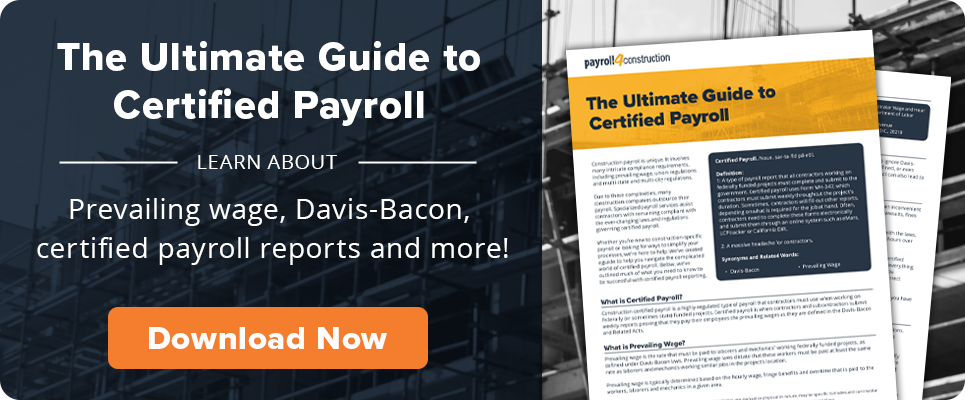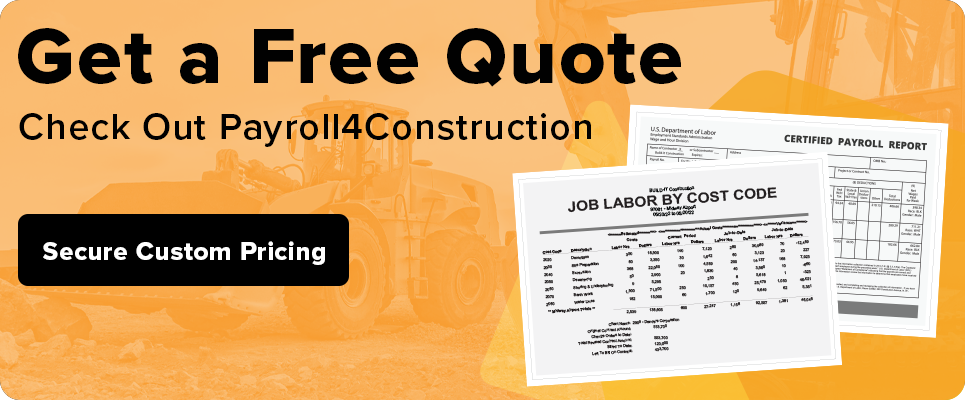Simplifying Payroll During Davis-Bacon Jobs

January 3, 2024
Government jobs can be attractive to contractors for many reasons. They offer reliable payments from government agencies (which helps reduce employee turnover) and provide experiences that can give contractors a competitive advantage.
However, working government jobs comes with dealing with government regulations; specifically, for federal construction projects, the Davis-Bacon Act— an act that not only sets wage requirements but also mandates weekly reporting. Before applying for these lucrative opportunities, contractors need to be conscious of how the Davis-Bacon Act impacts the job.
Understanding prevailing wage and certified payroll can be tedious, but it’s essential for any construction professional wanting to both capitalize on federal work and simplify how they manage Davis-Bacon.
The good news? It doesn’t have to be a challenge. Below, we’ve broken down Davis-Bacon into more manageable pieces and offered strategies to streamline the reporting process. By thoroughly understanding Davis-Bacon, you maximize your opportunity to run profitable government jobs.
What is the Davis Bacon Act?
The Davis-Bacon Act was passed in 1931, and it was designed to bring fair competition to the construction industry. Basically, law makers wanted to protect laborers— there was an unpleasant trend happening where owners were winning government jobs because they submitted low bids. These low bids were only possible if the labor wages were cut.
The Davis-Bacon Act requires contractors and subcontractors that work on federally funded projects to pay their laborers a prevailing wage (or benefits and wages) that is no less than what other workers are paid to complete similar projects in the same area. Guaranteeing that employees’ pay won’t get cut even when the job is awarded.
Today, the Davis-Bacon Act is used to promote fair labor practices, help prevent worker exploitation, and support the growth of the construction industry.
Davis-Bacon typically concerns any contract for the construction, alteration, or repair of public buildings and public works over $2,000. It also requires the contractor or subcontractor to prominently display the wage scale at the jobsite.
Davis-Bacon Act requirements apply to all laborers and mechanics employed by contractors and subcontractors with job duties that are manual in nature. This includes the work of laborers and mechanics, as well as watchmen, guards, and foremen, under certain conditions. The new changes to the Davis-Bacon and Related Acts (DBRA) state that work conducted off-site or at a secondary location where a significant portion of the work is completed can be covered as well.
If you want to learn more about the changes to the Davis-Bacon Act, read our Frequently Asked Questions page!
What is Prevailing Wage?
In accordance with the Davis-Bacon Act, contractors and subcontractors on federal jobs must pay their workers at minimum the local prevailing rates for similar jobs in the region where the project is being completed. Because of the mandates in the Davis-Bacon Act, prevailing wage is specific to geographical location.
The best way to think of prevailing wage is as the minimum wage for construction laborers working on public or federally funded projects. This law requires local prevailing wage rates for federal and public developments to be determined by the U.S. Department of Labor, and each prevailing wage rate is set by the Secretary of Labor.
Davis-Bacon projects often involve a variety of trades and job classifications, each with its own prevailing wage rate. Assigning the correct wage rate to each worker is based on their specific job duties. Wage determination for each job is set by the same government agency but differs by trade. To verify wage compliance and requirements, Davis-Bacon projects are often subjected to audits by government agencies.
What is Certified Payroll?
Certified payroll is a special weekly payroll report that contractors need to complete and submit to prove they are paying workers the prevailing wage. To meet the requirements for certified payroll, employees must be paid prevailing wage weekly. This also means complying with the state’s prevailing wage rates.
Contractors demonstrate compliance by completing and submitting Form WH-347 each week, typically seven days after the regular pay date for the pay period. The WH-347 form requires information about these employees, such as:
- Names
- Social Security numbers
- Gross and net wages
- Benefits
- Hours
- Job classification (e.g. electrician, carpenter, etc.)
- Withholdings
A Statement of Compliance confirming that each employee has been paid prevailing wage must be signed by the contractor or subcontractor or an authorized officer or employee who supervises payroll to validate the information’s accuracy.
If contractors are working on a construction project that’s fully funded by state dollars, depending on where the state is, a different state-specific certified payroll report may need to be filed.
Once a certified payroll report is properly completed and filed, the records must be maintained for the required time period. For example, on federal jobs, certified payroll reports must be retained for at least 3 years after the project completion date, whereas for state projects, the timeframes vary.
What Makes Davis-Bacon Challenging?
The Davis-Bacon Act requires contractors to accurately classify workers, determine appropriate wage rates, and ensure compliance with changing regulations. Non-compliance with Davis-Bacon regulations can result in serious consequences, including fines, contract termination, and debarment from future government contracts.
Contractors are also required to maintain detailed and accurate records of their payroll activities, including hours worked, wages paid, and other relevant information, which can be particularly difficult on larger projects with a substantial workforce. Certified payroll reports must be submitted to the contracting agency or federal government. These reports must include accurate and detailed information, including wages, hours worked, and calculated fringe benefits to avoid penalties and disputes.
Contractors can also have employees working on Davis-Bacon jobs and non-government jobs simultaneously. This makes tracking payroll even more essential because prevailing wage rates are ONLY applied to the federal project hours.
As well, Davis-Bacon projects can involve both union and non-union workers, each with its own unique compensation structures and requirements. Contractors must ensure that they meet the specific requirements for both types of workers. Prevailing wage rates are subject to regular updates, often on an annual basis. Keeping up with these changes ensures that all workers are paid the correct wages.
How Can Prevailing Wage Payroll be Simplified?
The liabilities that can arise from mishandling the Davis-Bacon Act requirements are significant. Not only can you incur significant financial liability, but you can also lose your federal contract revenue stream for up to three years. Simplifying payroll on Davis-Bacon jobs requires a combination of technology, training, process standardization, and compliance expertise.
By adopting these strategies, contractors can reduce the complexities associated with payroll management while ensuring adherence to the law.
- Outsourcing Payroll
The best way to simplify prevailing wage is to invest in a payroll service designed to handle prevailing wage calculations, job classifications, and reporting requirements specific to Davis-Bacon projects.
A construction-specific can automate prevailing wages so the correct pay rates and fringes default for each employee. These services can also help manage and calculate fringe benefits accurately and in compliance with Davis-Bacon requirements.
Printed certified payroll reports can be accessed instantly, and certified payroll reports can be electronically submitted to the government on behalf of contractors. Using a payroll service that can generate the necessary certified payroll reports automatically can save time and ensure accurate reporting to government agencies.
Because of the specifics that come with certified payroll, finding a service that is specific to the construction industry is crucial. A construction-specific payroll service, such as Payroll4Construction, also allows access to reliable experts with in-depth industry knowledge, information on regulations, and support for issues.
- Mobile Tools
Embracing technology can be instrumental in simplifying certified payroll. Consider implementing mobile time and attendance systems to track information from the field.
With a mobile solution, contractors can:
- Enter, edit and submit timecards using their devices.
- Clock in and clock out electronically for more accurate labor hours
- Reduce manual data entry errors.
- Approve timecards instantly.
- Obtain employee signatures for verification and compliance quickly.
- Access reports immediately at the jobsite.
- Training & Education
Even if you choose to outsource certified payroll, it’s important to provide training for payroll staff on Davis-Bacon regulations, wage determinations, and reporting requirements. Ensuring that everyone understands the complexities of Davis-Bacon compliance can help prevent errors when submitting payroll information.
The U.S. Department of Labor regularly updates prevailing wage rates and regulations. Stay updated on changes to wage determinations by setting up automated alerts to receive notifications about revised guidelines. Using the most current wage information when processing payroll will help to avoid complications. Government websites, industry associations, and legal resources can be valuable sources of information.
Government contracts are subject to regular audits from federal agencies, however conducting regular internal audits of all payroll records is important to identify and address any discrepancies or issues before they become major problems during external audits.
- Prioritize Accuracy
Accuracy in certified payroll reports is essential for maintaining compliance. Consider working with legal experts or consultants who specialize in construction/ Davis-Bacon. They can provide guidance on interpreting regulations, addressing complex situations, and ensuring payroll practices align with the law.
Developing standardized procedures can streamline payroll management. You can start by centralizing all information regarding certified payroll and prevailing wage. Maintaining a database that contains accurate and up-to-date information about each worker, including their job classification, wage rates, hours worked, and benefits, can help to organize important information.
Also, keep thorough records of all payroll-related activities in general, including wage calculations, hours worked, benefits provided, and any correspondence with government agencies. Comprehensive documentation can help demonstrate compliance when being audited.
Be sure to maintain open communication with subcontractors, unions, and government agencies involved in the project. Clarify expectations, reporting requirements, and any changes to wage determinations regularly.
Simplify Payroll With Payroll4Construction
Davis-Bacon jobs are a matter of compliance and regulations; however, it shouldn’t discourage contractors from bidding on these jobs. Partnering with a construction-specific payroll service can be a game-changer for contractors and subcontractors navigating the complexities of prevailing wage laws.
Payroll providers like Payroll4Construction are available to help companies simplify certified payroll, streamline administrative processes, and avoid costly errors. By entrusting payroll to experts who understand the nuances of Davis-Bacon, you can take on more Davis-Bacon jobs while working with confidence.
Share Article
Keep on current news in the construction industry. Subscribe to free eNews!


